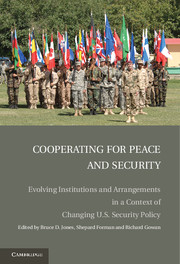 Cooperating for Peace and Security
Cooperating for Peace and Security Book contents
- Frontmatter
- Contents
- Contributors
- Foreword
- Acknowledgments
- I FRAMEWORK
- 1 Introduction: “Two Worlds” of International Security
- 2 “The Mission Determines the Coalition”: The United States and Multilateral Cooperation after 9/11
- 3 UN Transformation in an Era of Soft Balancing
- II ADAPTING COLD WAR INSTITUTIONS
- III NEW TOOLS, NEW MECHANISMS
- IV CONCLUSIONS
- Index
- References
2 - “The Mission Determines the Coalition”: The United States and Multilateral Cooperation after 9/11
Published online by Cambridge University Press: 22 January 2010
- Frontmatter
- Contents
- Contributors
- Foreword
- Acknowledgments
- I FRAMEWORK
- 1 Introduction: “Two Worlds” of International Security
- 2 “The Mission Determines the Coalition”: The United States and Multilateral Cooperation after 9/11
- 3 UN Transformation in an Era of Soft Balancing
- II ADAPTING COLD WAR INSTITUTIONS
- III NEW TOOLS, NEW MECHANISMS
- IV CONCLUSIONS
- Index
- References
Summary
A distinctive attribute of U.S. global engagement under President George W. Bush was skepticism of the capacity of standing international institutions and alliances to confront the main threats to national and global security, particularly terrorism, rogue states, and the proliferation of weapons of mass destruction (WMD). This attitude, apparent from the first days of the Bush administration, was accentuated by the terrorist attacks on the United States on September 11, 2001.
Although this sentiment was sometimes expressed through unilateral action, including decisions to act alone in pursuit of national objectives or to opt out of international agreements endorsed by the vast majority of other states, the more typical pattern was for the United States to turn to a more flexible form of multilateralism, by championing ad hoc and in some cases temporary coalitions of the willing that coalesced to address new issues. Such informal groupings of like-minded countries under American leadership – beyond avoiding the pathologies of formal multilateral organizations like the United Nations (UN) – promised to expand U.S. policy autonomy and freedom of action and provide greater control over the goals of collective action. The potential costs of this approach, in terms of squandered international legitimacy for U.S. actions and lost opportunities for sharing burdens – to say nothing of the eroded institutional foundations of world order – were only dimly appreciated, particularly during the first term of the Bush administration.
- Type
- Chapter
- Information
- Cooperating for Peace and SecurityEvolving Institutions and Arrangements in a Context of Changing U.S. Security Policy, pp. 20 - 44Publisher: Cambridge University PressPrint publication year: 2009
References
- 2
- Cited by


